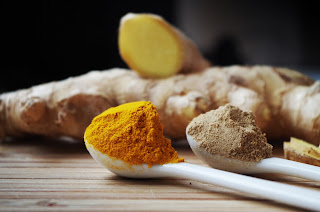Turmeric Capsules: All You Need To Know About This Healing Spice
Turmeric, also known as the golden spice orIndian saffron, is an ancient spice that has been used for culinary and medicinal purposes since ancient times. Curcuma longa is the botanical name for the turmeric plant which is usually harvested in India and other SoutheastAsian countries.
If you have never heard of turmeric before, it is a spice
derived from the rhizome of the turmeric plant. Using turmeric in cooking is
not new. In fact, it has been found in Asian kitchens for thousands of years!
Recently it has gained immense popularity, not for its pungent flavour in
cooking but for its medicinal properties.
It can be said that turmeric is one of the most effective
nutritional superfoods in the world. Turmeric is a member of the ginger family
and is commercially available in different forms such as a spice, powder, root,
capsule, tea and extracts.
Now, before you get tempted to visit the spice aisle and stock
up on this magic spice, here’s everything you need to know about it to make the
right choice for you.
What Is Curcumin?
There are numerous
chemical compounds found in turmeric, with curcumin being the most important
compound. It is the main active ingredient in turmeric and has powerful
antioxidant and anti-inflammatory properties.
Curcumin makes
turmeric a functional food; the food that has potentially positive health
effects. However, the amount of curcumin found in turmeric is not that great. [1] Thus, it becomes extremely difficult to get
sufficient curcumin intake by using turmeric as a spice in the meals. That’s
why it’s highly recommended to take turmeric supplements that comprise of a
substantial quantity of beneficial curcumin in it.
What Is the Nutritional Value of Turmeric?
As suggested by
the United States Department of Agriculture (USDA) National Nutrient Database,
one tablespoon of turmeric powder contains: [2]
- Calories - 29
- Protein - 0.91 g
- Fat – 0.31 g
- Carbohydrates –
6.31 g
- Fibre – 2.1 g
- Sugar – 0.3 g
The same 1
tablespoon of turmeric powder provides: [3]
- 16 % of daily
iron needs
- 26% of daily
manganese needs
- 5% of daily
potassium needs
- 3% of daily
vitamin C needs
TheIssue of Curcumin & Its Bioavailability
Curcumin tends to
have antioxidant, anti-inflammatory, anticancer & neurotrophic activity,
helping in preventing and treating several ailments. Although it works wonders
on health, the poor bioavailability of curcumin becomes a major barrier to its
clinical efficacy.
So,
what is bioavailability and why it is so important?
Bioavailability
(BA) is the rate at which the part of the substance is absorbed by the body’s
circulatory system to have an active effect on it. This concludes that turmeric
contained curcumin is very poorly absorbed in the body and the bioavailability
of turmeric capsules needs to be improved. There are several reasons that
contribute to the poor bioavailability of turmeric capsules. It includes:
- Its swift
metabolism and excretion from the body.
- The way it is
distributed throughout the body tissues.
- Its short-life
decreases its activity in the body.
- Its low
solubility in water.
Fortunately, there
are numerous ways to improve the bioavailability of turmeric and turmeric
capsules.
- Combine turmeric
with black pepper. Black pepper is rich in piperine, a natural substance
which helps in boosting the curcumin absorption rate by 2000%. [4]
- You can mix
turmeric with fats such as olive oil, flaxseed oil or coconut oil.
- The micronized
powder and the liquid micellar formulation of Curcumin help in increasing
its oral bioavailability. [5]
All in all, using
any of the above methods can significantly increase the bioavailability of
turmeric.
Important Health Benefits of Turmeric and Curcumin:
1. It is Anti-Inflammatory
Curcumin, the
active ingredient in turmeric is a potent anti-inflammatory that helps in
maintaining healthy inflammation responses. Its anti-inflammatory properties
have been beneficial in treating rheumatoid arthritis and osteoarthritis.
People suffering from
arthritis should consume the spice on a daily basis to relieve themselves of
inflammation and mild joint pain. One can also dissolve the powder turmeric in
water and apply it on the swollen area. This can provide you with immediate and
long-lasting relief.
2.
Aids Digestion
If you are
suffering from a digestive problem, consuming raw turmeric might help manage
the ailment. The major components of the spices stimulate the gallbladder to
produce bile which instantly makes the digestive system more efficient. It is
also proven to be beneficial in reducing the symptoms of gas and bloating.
3.
It Has Healing Properties
One of the major
health benefits of turmeric is its healing properties. Its natural
antibacterial and antiseptic properties make turmeric an effective
disinfectant. It also helps in accelerating the healing of wounds. For very
minor cuts and scrapes, applying a paste of curcuma powder and water can work
as a quick remedy.
4.
Helps in Diabetes
There’s good news
for people suffering from pre-diabetes. The anti-inflammatory and antioxidant
action of curcumin helps in delaying the inception of Type 2 Diabetes.
Additionally, it also helps in lowering the insulin level and boosts the effect
of medications that treat diabetes. Nevertheless, it is essential to consult a
physician before taking turmeric capsules with any other strong medicines.
5.
Boosts Immunity
Turmeric is
enriched with Lipopolysaccharide, a compound known for its antiviral,
antifungal and anti-bacterial agents which helps in stimulating the immune
system. Consuming turmeric milk on a daily basis can work wonders for your
health. All you need to do is add a teaspoon of turmeric powder in a glass of
warm milk and consume it on a daily basis. You can also give a try to turmeric
tea.
6.
Improves Liver Function
Turmeric is
popular for its antioxidant action. This helps in increasing the production of
the vital enzymes that helps to reduce the toxins while detoxifying the blood
in the liver. By boosting blood circulation, turmeric also helps in supporting
the health of the liver.
WhatAre The Possible Side Effects of Turmeric?
Both turmeric and
curcumin (its main active ingredient) are generally considered safe and with no
known side effects.et, when taken in large doses as supplements, it may cause
some common side effects in a few people. This may include nausea, dizziness, stomach
upset or diarrhoea. This is because a high dosage of turmeric increases the
secretion of stomach acid, which can cause digestive distress.
When used in small
amounts though, turmeric can be both safe and effective. However, when taken in
the supplemental form it might not be suggested for pregnant women as it may
possibly trigger contractions. The golden rule here is moderation. It’s the key
to enjoy the numerous health benefits of curcumin while not worrying about the
possible side effects.
RecommendedDosage of Turmeric:
Usually, studies
use doses of 500-2,000 mg of turmeric/day in the form of a curcumin extract.
This is much higher than the amount found in the natural turmeric. Let’s
understand this with the help of an example.
When used as a
spice, the average Indian diet provides around 2,000–2,500 mg of turmeric which
is 60–100 mg of curcumin per day. When extracted, the same amount can provide
up to 1,900–2,375 mg of curcumin. [7]
On the other hand,
when used as a spice, turmeric is still filled with numerous benefits. There’s
still no official agreement on the recommended doses of turmeric or curcumin,
however, listed below is the dosage used in research which exhibits promising results.
[8]
- Itchy skin:
500mg of turmeric extras twice daily for 8 weeks
- High
Cholesterol: 700mg of turmeric extra twice daily for 3 months
- Osteoarthritis:
500mg of turmeric extra twice daily for 2-3 months
It is highly
recommended to not take daily doses of turmeric and curcumin for the long-term.
However, the WHO (World Health Organization) has determined that the intake of
1.4mg of turmeric and curcumin/pound of body weight is acceptable. [9]
That said; always
remember that all herbal supplements should be used with caution. Always take
medical advice prior to taking any supplements, including curcumin and turmeric
capsules..
Common
FAQ's Related To Turmeric Capsules
1.
Aren’t turmeric and curcumin the same?
No, they are not.
Curcumin is not the same as turmeric. It is the main active ingredient of
turmeric responsible for most of its health benefits. It also gives turmeric
its characteristic yellow colour.
2.
What precautions should I take while consuming turmeric?
Turmeric is a
spice and is often considered as safe. Intake of 1-1.5 tablespoon of turmeric
powder a day is considered extremely safe. Curcuma capsules contain high % of
curcumin and an overdose can cause side effects.
3.
Can I take Curcuma capsules during pregnancy and lactation?
Many mothers
consume turmeric as a part of their diet throughout their pregnancy and
breastfeeding. However, it is highly recommended to consult a medical
practitioner prior to taking any supplements.
4.
Are curcumin supplements safe?
Derived from
turmeric extract, curcumin supplement has been labelled as safe with no known
side effects. That said always ensure to buy supplements of organic quality.
FinalTakeaway

Turmeric, and
especially curcumin (its most active compound), has numerous
scientifically-proven health benefits. The golden spice has proven to be
extremely beneficial in improving immune health, controlling blood pressure and
helping relieve pain. Its potent antioxidant and anti-inflammatory properties
help in improving the symptoms of arthritis and depression as well.
However, as with
any alternative therapy, it’s wise to speak to your doctor prior to taking
turmeric curcumin supplements to treat any ailment. Make sure to buy only
organic turmeric capsules and to use only organic turmeric powder in recipes.
References:
- National Center for Biotechnology Information (PMID: 17044766), 2006
- National Nutrient Database for Standard Reference Legacy Release, April 2018
- Self-Nutrition Data
- National Center for Biotechnology Information (PMID: 9619120), May 1988
- National Center for Biotechnology Information (PMID: 24402825), Mar 2014
- National Center for Biotechnology Information (PMCID: PMC5388087), Jun 2016
- National Center for Biotechnology Information (PMID: 21194249), Dec 2010
- National Center for Biotechnology Information (PMID: 28417091), Jun 2016












Comments
Post a Comment